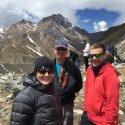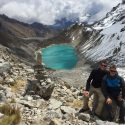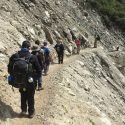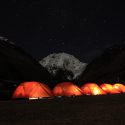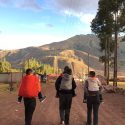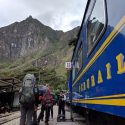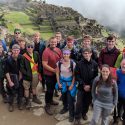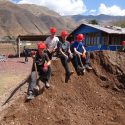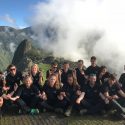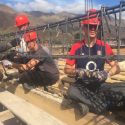Between 03 and 25 Aug 2018, 24 cadets and 8 staff from Sussex Wing ATC visited Peru thanks to the generous support of the Ulysses Trust.
The trip was part of Sussex Wings RAF100 Celebrations and coupled with another similar sized trip to NASA in Houston was aimed at engaging cadets from all the Sqns in Sussex Wing (it managed 21/22).
Following a comprehensive written application and selection process assessing the Cadets in leadership and leaderless team exercises, team exercises, social skills and a community task regenerating the gardens of a local retirement home, the team of 24 was finally chosen.
The team then proceeded to a training weekend in a very frozen Peak District in December, where as well as walking skills assessment the team received climatic injuries and altitude input from two doctors on Edale Mountain Rescue Team and some input on dry stone walling to look at the health and safety side of project work. After this they were lucky to spend a weekend with the Royal Navy Leadership Academy in Portsmouth – all this to shape them as individuals and a team, and all before even stepping foot in Peru.
The group were split into two teams of 4 staff and 12 Cadets and followed identical itineraries staggered by 5 days to give the project a solid 10 days of labour to achieve the aim. The expedition had to be done Project then Trek as the Project near Cusco (at 3500m) provided acclimatisation training for the trek to follow (high point 4650m).
We arrived at the project, Azul Wasi Orphanage, set up by a retired Police Officer to help orphans living on the streets of Cusco, to be met by 20 orphans waiting to help us unpack and set up our tents. Our project was to be furthering the construction of a new toilet block, of which the second floor would provide additional accommodation to expand capacity.
The groundwork had been done prior to our arrival, and the pillars for the structure put in place – Team 1 job was to construct the maze of ironwork that would form the reinforcement for the concrete floor between the first and second floors. This meant moving over 250 10m iron rods onto the roof, binding them together to form what looked like a space ship and then inserting the polystyrene insulation and expansion blocks – a feat of engineering and long hours of work to get it right.
The locals gave us funny looks as we donned out PPE, hard hats, gloves and safety goggles as they strode around in flip flops but photos since have seen them using the PPE we left behind!!
The second team arrived to see the structure complete and had the unenvious job of mixing and carrying nearly 30 tonnes of concrete, transporting it up onto the first layer, filling the metal supporting structure Team 1 had built and then smoothing off to build a watertight roof for ground floor / floor to construct as second level at some point in future.
In between building the team spent a lot of time playing football and other games with the orphans, taking and giving language lessons, learning about Quechan culture incl and early morning trek to a local ruins and cooking a meal for the whole project on the final night. Cpl Harrison from 1440 (Shoreham) Sqn also organised a separate crowdfunding to buy musical instruments for the project and every orphan a new pair of trainers and warm jacket to get them through the winter.
Cadet Harvey Betts of 1015 Horsham Sqn said:
“I didn’t realise what an effect the project would have on me, I came here for the mountains but will be going home more thankful for the little things I have and the support of my family because these guys just don’t have that.”
After that the team moved onto the Salkantay trail where they were to face a 75km trek over 4 days, including a 4650m pass and concluding at the Machu Picchu citadel. Day 1 was an early start to avoid the sun, starting with a meandering walk in the glacier basin to the High Camp at 4000m before a steep climb up one of the moraines gave access to the moonscape at the pass. The views were amazing, it had snowed recently and the snowline was pretty much down to the pass, to the point that a short diversion to view a glacial lake meant crossing a snow band to get there.
That night was a wild camp in the mountains waking to the most amazing sunrise over the pas we had taken the previous day.
The following day was a more gentle descent and recovery day down to a town called Colpa by the main junction of the Santa Teresa River, where we were able to see waterfalls and deep gorges carved out by thousands of years of powerful water action.
Day 3 was a long and hot day following the course of the Santa Teresa River which meandered through a combination of open meadow, forest and numerous landslides making some sections of the path “interesting”. Eventually the team arrived at their campsite, a functioning coffee plantation, where after dinner they were treated to a tour including picking their own coffee beans, roasting them and then grinding to make the most amazing coffee ever.
Day 4 was the final trek and started in the rain on a winding track which was now part of the original Inca Trail. Much of the walk was in the rainforest so although it kept the rain off it made the air very humid, especially as it warmed up. After about 3 hrs we reached the pass to be met with another set of Incan ruins and our first views to Machu Picchu in the distance, we also got an Incan history lesson, myth and fact from our local guide.
A steep, slippery descent on muddy trails affected by the rain meant progress was slow but eventually we made the basin and a short walk to the Hydroelectric station meant the trek was finished, having gone through four different ecosystems and we could get the train to Aguas Calientes – the gateway to Machu Picchu. The next day was an early start to beat the crowds and on arriving at Machu Picchu it was raining and shrouded in mist and both teams were concerned they wouldn’t get the views they craved – but almost on command the rain stopped, the mists clears and we were treated to those postcard perfect views
Cpl Katie Turner said:
”This has been amazing, me being half Peruvian, I never thought I would get to visit the country of my family, let alone meet a half sister I had only talked to on the phone – I was really worried about the trek, and I did struggle but the team kept me going and it was so worth it for the endless views!”
The final day was spent returning to Cusco by train and bus before heading out on an end of expedition meal to celebrate all that had been achieved and reflect on what we had done. The cadets also as part of the process were able to gain their ATC Silver Leadership badges, first in Sussex Wing, and are in the process of finishing off their ILM Level 3 Award (equivalent to an A Level) in Team Leading and Motivation through CVQO.
Our thanks go to the generosity of the Royal Air Force Charitable Trust for supporting this expedition. www.rafct.com

